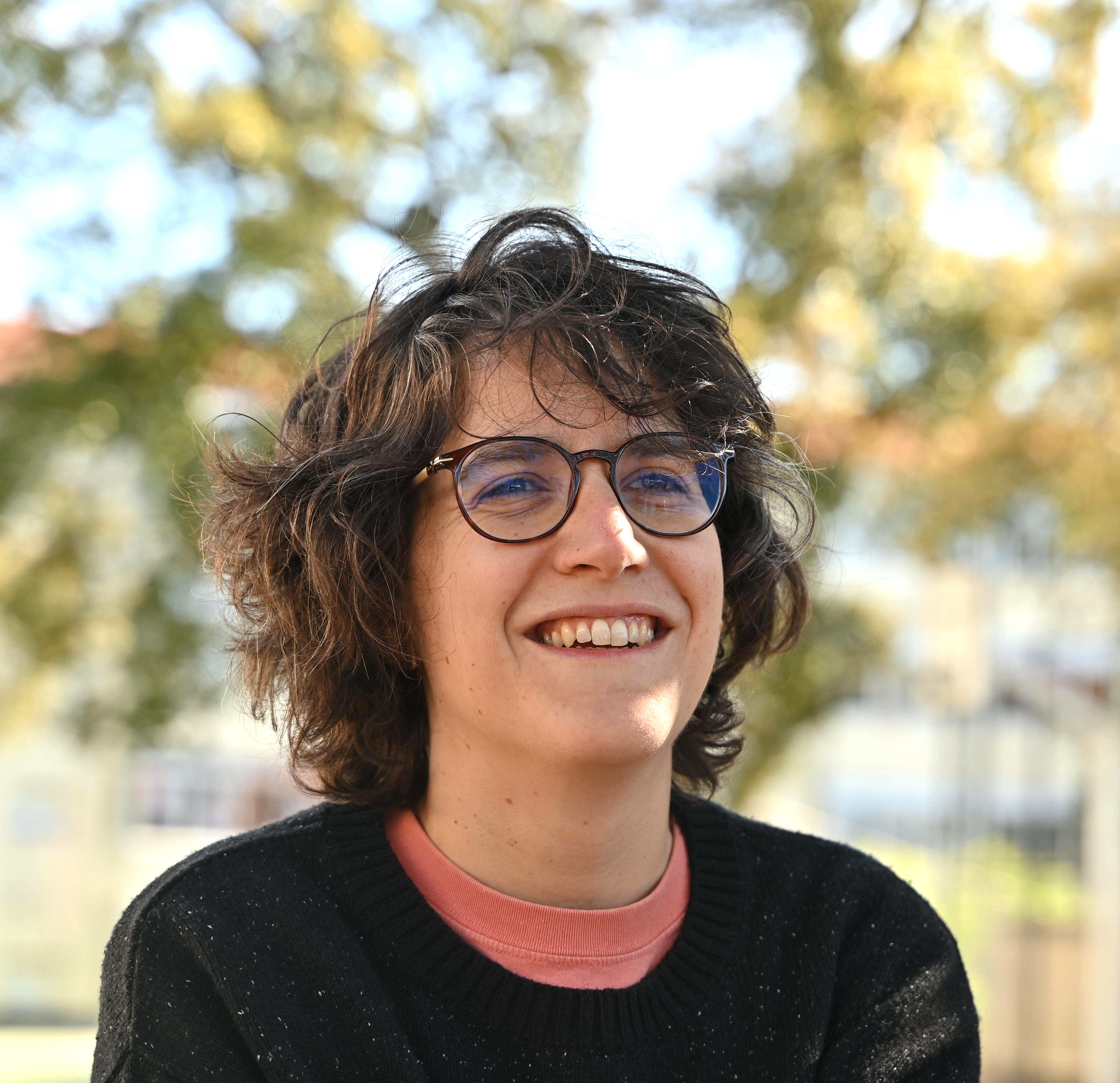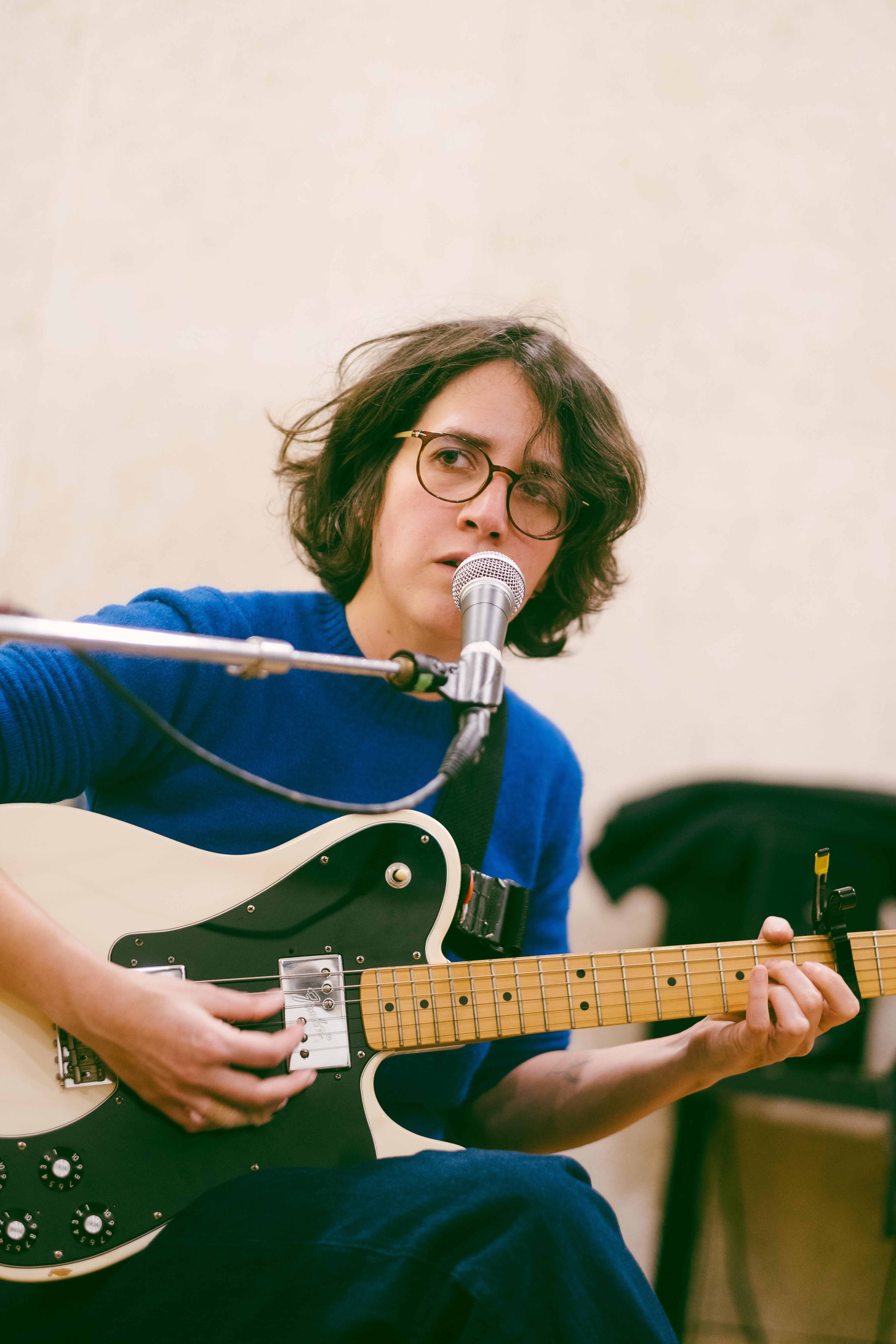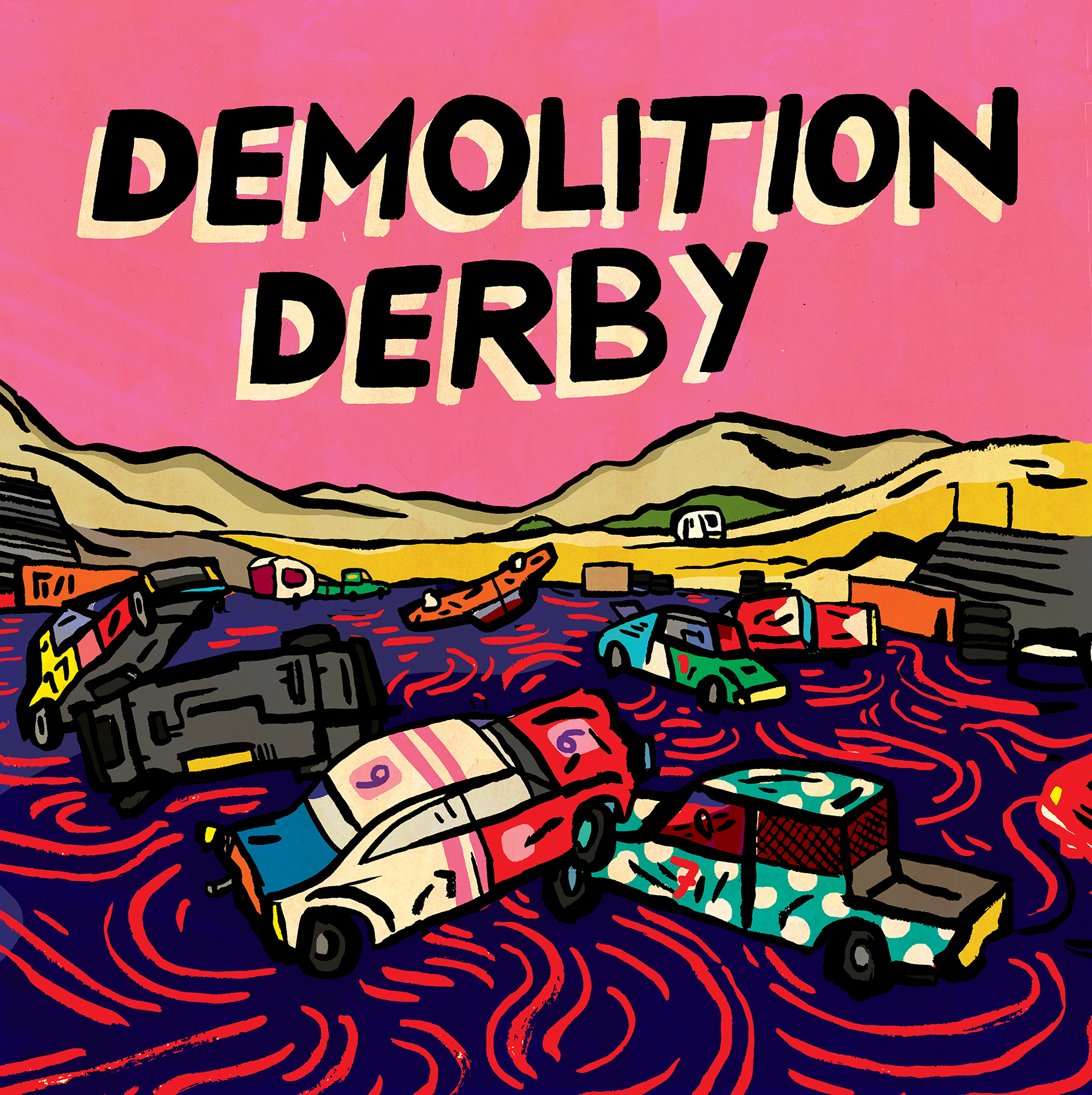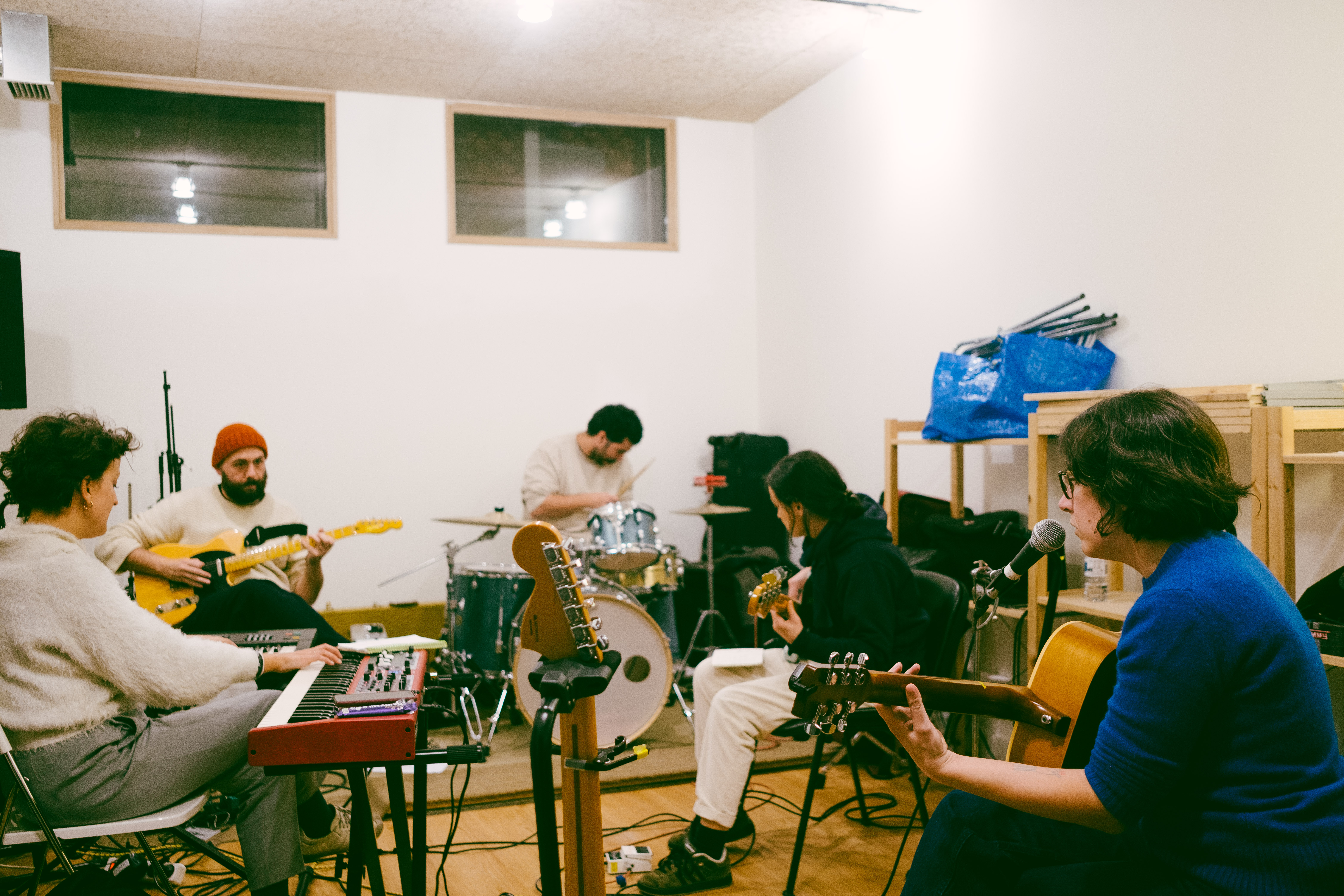EN

Born in Porto but living in Lisbon, Francisca Cortesão is a singer, songwriter and multi-instrumentalist, among many other things, including writing and literary translations. After all, music and writing are intertwined and her artistic practice has taught her how to combine everything in an excellent way. We took advantage of her participation in Cultura em Expansão to talk to her.
Agenda Porto: How did music come into your life?
Francisca Cortesão: I don't know how it came into my life, because I think it's always been there. In other words, I lived in a house where there was always music and where everyone learnt to play the piano, or those who didn't learn had the facility to pick up a guitar and play a few chords. Although it's not a family of musicians, they are people who listen to a lot of music and have that sensitivity. I started taking music lessons when I was at primary school, then I gave up and went back to piano lessons when I was ten. Informally, I learnt to play the piano with my great-aunt Irene, who loved teaching and had a lot of patience.
AP: The piano was your first musical instrument. When did you feel the urge to explore others?
FC: It was at holiday camps that I picked up a guitar, and I was fascinated. And then, although I loved playing the piano, it required a discipline that I didn't have at the time and so I started to explore the guitar more. I ended up giving up this more formal study and began to dedicate myself to bands. Nowadays, I mostly play guitar, but I also play bass, keyboards (when I need to) and I can still play the piano, but I'm not a pianist; I never studied enough for that, but [what I learnt] was enough for me to be able to play and serve my own songs, and when I need to play keyboards, I do. So I'm quite comfortable with it. But I think my instrument of choice is the guitar and my voice.

© Rui Meireles
AP: What were your influences? Were there any bands that inspired you along the way?
FC: Ever since I had a guitar at home, I started to play songs by ear; that is, after learning four or five chords at holiday camps and with the help of some music books to learn how to play, I started to feel comfortable accompanying some songs with the guitar. From the age of ten, I spent many hours of my life listening to CDs and the radio and trying to understand how songs were played so that I could accompany them on the guitar. At the time, my first 'crush' was Nirvana.

© Vera Marmelo
AP: Have you always known what you wanted to do or has life moulded you in one direction?
FC: I do a lot of things... I always knew I liked music and I took it very seriously. I remember, when I was twelve or thirteen, not going on holiday with my parents because I said I had to rehearse. It was a serious matter, it always was. But at the same time, I thought I was going to study science and that didn't happen because I've always had a much easier time with languages (I'm also a translator) than with maths. It's something that's innate in me and doesn't require much effort on my part. So somewhere around the turn of tenth grade I thought... I'm not going to go against nature. Some things are easy and instinctive and others are not. So I went for what came most naturally to me, much to the disappointment of some of my family. It was also disappointing that I gave up the piano. Both were things I was capable of doing, but they were more work.
AP: During your musical career, was there a moment that marked you out as an artist and that you can highlight?
FC: Perhaps the moment when I went to live in Lisbon because we got a recording contract with a major label for our band (Casino). I was very young and the whole thing was very exciting at first, we even released an album (which didn't have much visibility), but things ended up not going so well and I had a reality check with the music industry. Expectations were very high and then it turned out to be a disappointment and the band didn't survive. It was remarkable on that level, it crossed my mind to give up, but it was also remarkable in the rebuilding that came from that. I started to temper my expectations and work in a more organic way, with friends, with small labels, playing in small places and that was a rebirth, I started to work on a much more human scale, more sustainable and so it was a remarkable moment.
AP: Talking about your projects, Minta & The Brook Trout (2006) is your main project, isn't it? Is it still your focus?
FC: It's one of many. Minta has been me, so to speak, for over ten years. I released my first EP without a band in 2008 and it's one of my most constant projects. We're currently recording an album, but it's a project that's been on hold and, at the same time, it's not exactly the most productive activity of my life. There's no rush, we record discs from time to time, without pressure. We do some concerts, I love them, but it's not a commercial music band, so it doesn't reach large audiences and that's why it's not sustainable. At the moment, most of my time is taken up with new projects.
AP: What projects are those?
FC: Yes. At the end of last year, Afonso Cabral and I, one of the people who does this workshop with me (Mais Alto! Protest songwriting workshop for children, as part of Cultura em Expansão), opened a studio in Lisbon. This has been our priority, the project to which I devote most of my time. It's a recording studio, a label, an agency and it's called Louva a Deus. Because it used to be a Baptist church; it has crucifixes on the door, and we didn't destroy anything, we built on top.

Cover of Minta & The Brook Trout's latest album, Demolition Derby, from 2021. Illustration by Bernardo P. Carvalho
AP: Mão Verde and Mais Alto! are two projects designed for children. How did they come about?
FC: Mão Verde is a project by Capicua and Pedro Geraldes, focussed on environmental and ecological issues. They made the first disc, and later they wanted to put on a show with more musicians and invited me. The second disc was created by Capicua, Pedro Geraldes, António Serginho and myself; the four of us wrote the songs. The concerts are supposed to be aimed at children, but as Ana herself says, "it's music for children who don't want to be children". And this is a point in common between the two projects: Mão Verde and Mais Alto! The difference? Mão Verde are original songs, Mais Alto! doesn't have its own songs, but an almost infinite repertoire of interventional music from all over the world that we adapt and make our own versions of in a very free way. The latter is a commented concert, we play the songs (Inês Sousa on keyboard, Afonso Cabral on bass and Sérgio Pacheco on drums) and Isabel Minhós Martins (editor of Planeta Tangerina) or João Vaz Silva comment and explain. They can be songs from the 1970s, by Zé Mário Branco or Zeca Afonso, but they can also be more recent songs. There's always a contextualisation, because we can't assume that a child born in 2010 knows who Sérgio Godinho, Titãs or Xutos e Pontapés are - or rather, curiously, [the children] do! (laughs).

Rehearsals for the first recordings of the new album, taken on 6 March 2024. Francisca Cortesão (electric guitar), Mariana Ricardo (bass), Tomás Sousa (drums), Margarida Campelo (keyboards), Afonso Cabral (electric guitar). © Vera Marmelo
AP: Music, writing, editing and translating texts... is there always mental and creative availability?
FC: I recently started taking an online songwriting course at the School of Song in Portland (USA) and I realised that even better than the lessons are the homework assignments. When I'm told that by Thursday I have to write a song, that it has to contain a word, that rhythmically it has to be like this, I write. I need deadlines, but apart from that I'm always jotting down ideas on the phone and then I can go after those ideas, glean them and write things down.
AP: Do you have any themes written down on your phone at the moment to develop later?
FC: A very stupid thing (laughs). You know that my band's songs have very... particular micro-themes. And there's something that's been bothering me, which is when the phone rings, I pick it up thinking there's a person on the other end and there's one of those voices saying "Hello! We want to know how your interaction with our service was". There you go, that feeling of picking up the phone and thinking I'm talking to a human being and it's a machine.
AP: On the subject of "machines", what do you think of artificial intelligence?
FC: It makes me dizzy. I'm going to have to learn to live with it. In fact, I already live with it many times without realising I'm living with it, because we all do. I'm more of an apologist for manual labour, things take time to do and I respect and like that slower time.
AP: But do you think you could use artificial intelligence in your creative process? Can you see the potential in ChatGPT, for example?
FC: Maybe. In fact, I've always used things that are equivalent, like the dictionary, to compose. Artificial intelligence is also a wealth of knowledge at our disposal, I realise that. I once asked chatgpt to write me a song in English and it did, it had all the air of a folk song, the kind I like and write, but it didn't have...
AP:... soul? It wasn't yours?
FC: It didn't belong to anyone! It didn't have any soul! Maybe one day it will.
AP: What is the role of music in today's society? Should artists have a social, political or educational responsibility?
FC: I think they can, but it's not obligatory. It's perfectly legitimate for someone to write more personal songs, as is the case with me. Not all music has to be intervention music, nor do all artists have to play an active role. But it's very important to have interventionist artists and informed people speaking out. Nowadays, everyone has opinions, but not everyone has informed opinions, and it's important to have people like Capicua, among others.
AP: If you could give advice to new artists, would you have done anything differently?
FC: I wouldn't have given up the piano, I would have continued with the lessons and there would have been no point in learning later what I could have learnt at that time when I had a spongier brain. The problem was that I had an enormous power of argument and said that if I learnt more piano it would ruin my creativity - Bullshit! In other words, I don't think anyone gets less personality from singing lessons, or less creativity from learning harmony or music. And I had these ideas in my head, I'm not sure why. I don't know where I got it from: Oh, this is going to ruin my creativity. It won't! Learning is very useful!
by Maria Bastos
Share
FB
X
WA
LINK
Relacionados

